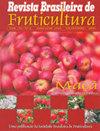Effect of a fungal glycoprotein on scab control caused by Cladosporium herbarum in passion fruit plants
IF 0.9
4区 农林科学
Q4 HORTICULTURE
引用次数: 0
Abstract
Abstract Phytosanitary problems drastically affect passion fruit cultivation around the world. Scab, a fungal disease that attacks the aerial part of plants, especially the younger leaves, impairs development and reduces plant productivity. The objective of this work was to evaluate the effect of treatment with a fungal cell wall glycoprotein, named pGM from peptidogalactomanann, in the control scab caused by Cladosporium hebarum infection. Under greenhouse conditions, morphological parameters or plant development were evaluated in two passion fruit genotypes, ‘H09-110/111’ and ‘FB300’. pGM treatment was able to mitigate the damage caused to plant development in parameters such as height, the number of leaves, stem diameter, leaf area and biomass in the ‘H09-110/111’ genotype compared to the control. However, in the genotype ‘FB300’, no significant differences were observed concerning the control. Passion fruit scab disease incidence and severity were also reduced by pGM treatment. Therefore, this study suggests that the use of pGM can lead to control and attenuation of the damage caused by this fungus in the early stages of passion fruit plants ‘H09-110/111’ when the plants are more susceptible to biotic stresses.一种真菌糖蛋白对百香果枝孢子虫病的防治作用
植物检疫问题严重影响着世界各地的百香果种植。疥疮是一种真菌病,它侵袭植物的地上部分,特别是年轻的叶子,损害植物的发育并降低植物的生产力。本研究的目的是评价一种真菌细胞壁糖蛋白(pGM)对肝枝孢子菌感染引起的对照结痂的治疗效果。在温室条件下,对‘H09-110/111’和‘FB300’两个百香果基因型的形态参数和植株发育进行了研究。与对照相比,pGM处理能减轻H09-110/111基因型植株在株高、叶数、茎粗、叶面积和生物量等方面对植株发育造成的损害。而基因型“FB300”与对照无显著差异。经pGM处理的百香果痂病发病率和严重程度均有所降低。因此,本研究表明,在百香果植株H09-110/111对生物胁迫更敏感的早期阶段,使用pGM可以控制和减轻该真菌对百香果植株的危害。
本文章由计算机程序翻译,如有差异,请以英文原文为准。
求助全文
约1分钟内获得全文
求助全文
来源期刊
CiteScore
1.50
自引率
20.00%
发文量
34
审稿时长
4-8 weeks
期刊介绍:
The Revista Brasileira de Fruticultura (RBF) publishes technical articles and scientific communications in the area of fruit crops, referring to results of original searches and unpublished papers in Portuguese, Spanish or English, and 1 or 2 reviews per edition, of invited authors.

 求助内容:
求助内容: 应助结果提醒方式:
应助结果提醒方式:


